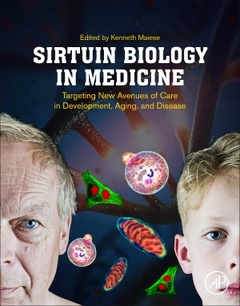Sirtuin Biology in Medicine Targeting New Avenues of Care in Development, Aging, and Disease
Coordonnateur : Maiese Kenneth

1. Novel treatment strategies for neurodegenerative disease with sirtuins
Kenneth Maiese
2. NAD1: a crucial regulator of sirtuin activity in aging
Nady Braidy And Maria Villalva (D.)
3. Sirtuins and life span extension
Shin-Hae Lee and Kyung-Jin Min
4. Sirtuins and aging
Brian J. Morris
5. Sirtuins in the biology of aging
Mateusz Watroba And Dariusz Szukiewicz
6. Sirtuins as regulators and the regulated molecules of exosomes
Qing Han, Yirui Cheng, and Weiliang Xia
7. Sirtuins in aging, age-related pathologies and their association with circadian rhythm
Sankarathi Balaiya
8. Sirtuins, mitochondria, and the melatonergic pathway in Alzheimer’s disease
G. Anderson and M. Maes
9. Sirtuins, melatonin, and the relevancevof circadian oscillators
Rüdiger Hardeland
10. Epigenetic role of sirtuins in neurodegenerative brain disorders
Archita Khanna, Anamika, and Surendra Kumar Trigun
11. Sirtuins and stem cell maintenance, proliferation, and differentiation
Ryan A. Denu and Peiman Hematti
12. Sirtuins in mechanistic target of rapamycin complex 1 signaling
J. Burillo, P. Marqués, B. Jiménez, C. González-Blanco, M. Benito, and C. Guillén
13. Free-radical redox timer, sirtuins and aging: from chemistry of free radicals to systems theory of reliability
Vitaly K. Koltover and Tatjana A. Skipa
14. Sirtuins, mitochondria, and exercise in health and disease
Anibh M. Das and Partha Dabke
Section II: Sirtuins, cardiovascular disease and end-organ disease
15. Scope to develop sirtuins modulators as a therapy to attenuate cardiac complications
Bugga Paramesha and Sanjay K. Banerjee
16. Role of sirtuins in cardiovascular diseases
Venkatraman Ravi, Sneha Mishra, and Nagalingam Ravi Sundaresan
17. Targeting sirtuins to modulate energy metabolism in heart disease
Tsunehisa Yamamoto and Ken Shinmura
18. Sirtuin 1 mediates hepatoprotective effects of resveratrol-like compounds in experimental liver injury
Hassan Farghali, Mighty Kgalalelo Kemelo, and Nikolina Kutinová Canová
19. Sirtuins as key players in aging and kidney dysfunction
Luca Perico and Ariela Benigni
20. Role of sirtuins in liver diseases
D. Ezhilarasan and M. Najimi
22. Vitagenes in avian biology: protective functions of sirtuins
Peter F. Surai, Ivan I. Kochish, and Vladimir I. Fisinin
23. Sirtuins in hematopoiesis and blood malignancies
Berta N. Vazquez, Irene Fernández-Duran, and Alejandro Vaquero
Index
Researchers (endocrinologists, cell biologists, molecular biologists, pharmacologists, vascular biologists, neuroscientists, etc.), Physicians (all disciplines including internal medicine, oncologists, neurologists, psychiatrists, cardiologists, etc.), pharmaceutical industry experts.
- Chapters are authored by internationally recognized experts who discuss the broad role of sirtuins in health and disease
- Details the basic and clinical role of sirtuins for the development of new clinical treatments
- Summarizes the multidiscipline views and publications for the compelling discipline of sirtuins by covering systems throughout the body
- Serves as an important resource for a broad audience of healthcare providers, scientists, drug developers, and students in both clinical and research settings
Date de parution : 02-2021
Ouvrage de 420 p.
21.4x27.6 cm
Thèmes de Sirtuin Biology in Medicine :
Mots-clés :
?AD; AMP kinase; Acetylation; Acute renal failure; Aging; Alzheimer’s disease; Antioxidants; Apoptosis; Atherosclerosis; Autophagy; Bone metabolism; CI; Calcium; Caloric restriction; Calorie restriction; Cancer; Carbon tetrachloride; Cardiac; Cardiac hypertrophy; Cardiomyopathy; Cardiovascular disease; Cardiovascular diseases; Cartilage metabolism; Cell differentiation; Cell growth; Cellular energetics; Chronic kidney disease; Circadian; Circadian rhythm; Circular RNA; Clock genes; D-galactosamine; Deacylation; Dementia; Diabetes; Diabetes mellitus; Differentiation; EX-527; Embryonic stem cell; Endothelial dysfunction; Energy metabolism; Epigenetic regulation; Erythropoietin; Excitotoxicity; Exercise; Exosome; Fatty liver diseases; Fibrosis; FoxO; Free radicals; Genome stability; HD; HE; Heart; Heart failure; Hematopoiesis; Hematopoietic stem cell; Heme oxygenase-1; Hepatic fibrosis; Hepatic stellate cells; Hepatitis; Hepatocellular carcinoma; Hepatoprotection; Hepatotoxicity; Hypertrophy; Immune response; Immunomodulation; Immunosuppression; Inborn errors of metabolism; Inflammation; Intercellular communication; Intracellular mechanisms; Ischemia-reperfusion injury; Ischemia/reperfusion injury; Ischemic heart disease; Ischemic-reperfusion; Leaky gut; Leukemia; Life span; Life span extension; Lipopolysaccharide; Longevity; Lymphoma; MTOR; MTORC1; Melatonin; Mesenchymal stromal/stem cell; Metabolic reprogramming; Metabolic syndrome; Metabolism; MicroRNA; Mitochondria; Molecular genetics; NAD; NAD+; Neurodegeneration; Neuroimmune; Nicotinamide adenine dinucleotide dependent protein deacetylases; Obesity; Oscillator



